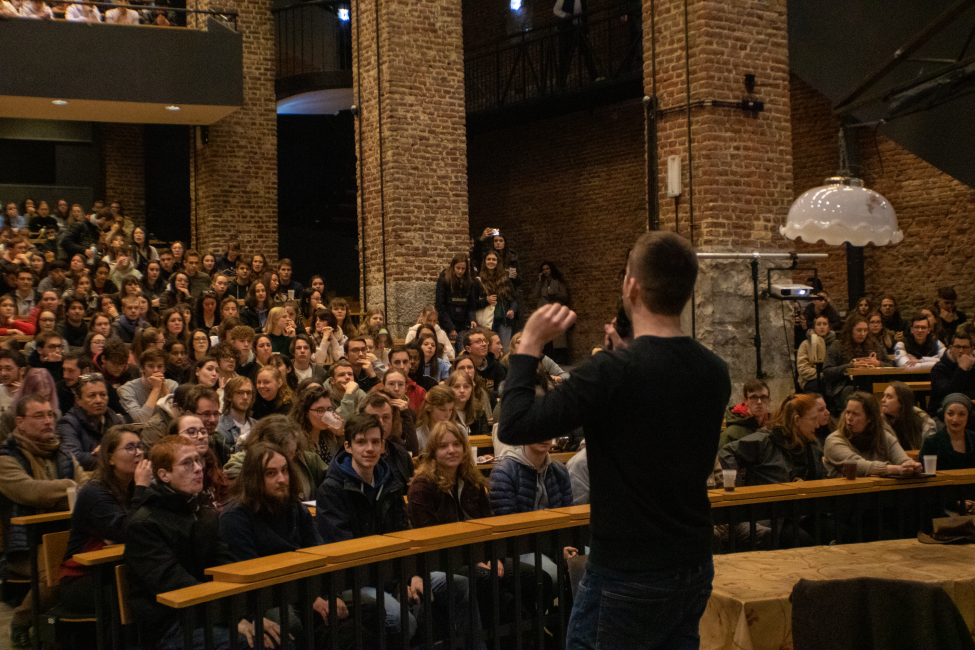This has been a tradition since 2016: every year, Vétérinaires Sans Frontières Belgium and its partner SOS Faim raise awareness of food sovereignty among first-year bachelor students in Walloon agronomy departments. On 15 March this year, they all came together in Gembloux again for ‘Young Agriculturalists and Food Sovereignty’ day (Jeunes agros et souveraineté alimentaire, or Jagros for short).
With several years of solid experience behind them, the two NGOs decided to step up their efforts in academia, in partnership with Uni4Coop. That is how ‘Djesa’, a half day of exchanging views on food sovereignty (and a mini version of Jagros day) came into being in February 2023 in the different French-speaking universities of Belgium. At UCLouvain, it was intended for students in the second and third years of their bachelor’s degree in veterinary medicine.
With these two events in February and March 2023, we reached a total of more than 500 students.
Why talk about food sovereignty?
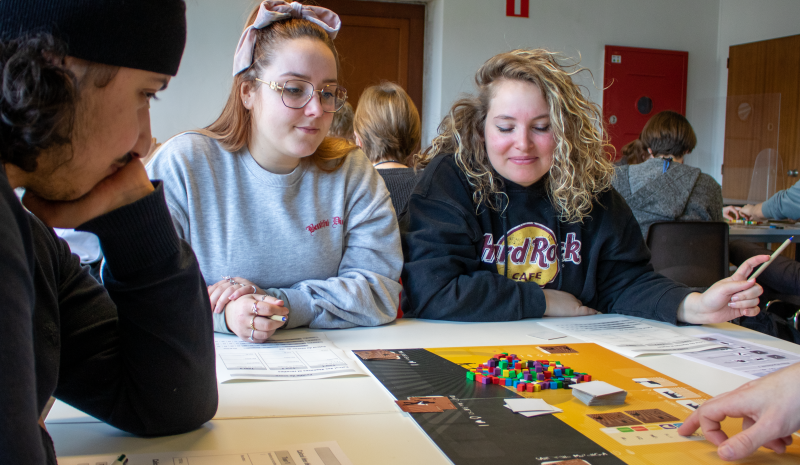
At the Jagros day, students could choose from about ten interactive workshops on food sovereignty.
According to Via Campesina, food sovereignty means “the right of populations to healthy and culturally appropriate nutrition produced by sustainable methods, and the right of populations to define their own agricultural and food systems”. Hence it is a concept closely linked to our food production systems, which are increasingly under threat in our consumerist society.
In recent decades, we have seen a multitude of threats to our current food production system, which is reaching its limits. Whereas excess weight and obesity are a blight affecting more than 2 billion people, hundreds of millions more are suffering from undernourishment or nutritional deficiencies. The first to be hit are the millions of agricultural farmers living in extreme poverty in Africa, Latin America and South-East Asia. Industrial farming is gaining ground all over the world, with disastrous consequences for the environment and biodiversity and the risk that new pandemics will emerge. Not to mention the consequences in terms of animal well-being and the inequalities suffered by less industrialised countries.
These are issues that Covid-19 and the war in Ukraine have exacerbated, and which politicians have been unable to resolve, to judge by the new common agricultural policy and the failure of the COP 26 and COP 27 summits. So it is time to rethink this system and find solutions.
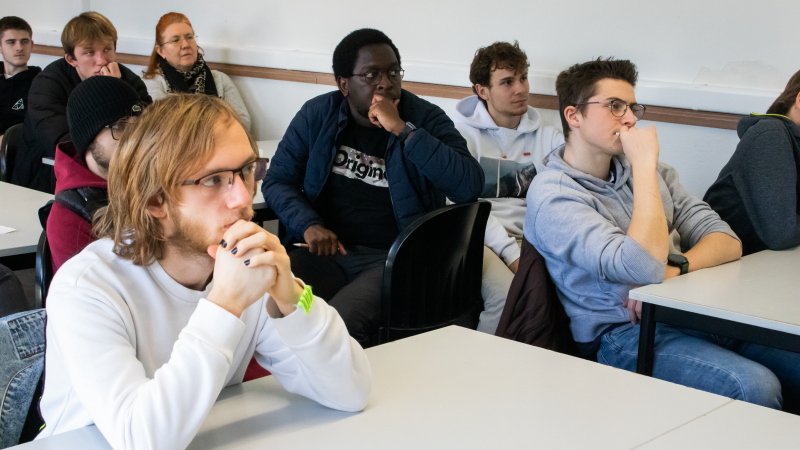
The Jagros and Djesa programmes are designed to make agronomy and veterinary students think about the challenges of food sovereignty.
How does this affect agronomy and veterinary students?
Whether they hope for a future as the head of an agricultural business, a job in the agro-food industry or as a vet, all the students we target have a role to play in the food system of the future. That is why raising their awareness of the concept of food sovereignty is a top priority for Vétérinaires Sans Frontières Belgium. Incidentally, this concept is at the very heart of our educational projects aiming for global citizenship and solidarity in Belgium.
Our objective is not merely to inform them of the negative impacts of the system that currently dominates, but also to show them alternatives and courses of political action. By thinking, debating and mobilising around the concept of food sovereignty, they become aware that they can change things. It starts with their consumption patterns: opting for short supply circuits, eating local, seasonal food and also eating better-quality meat in smaller quantities.
Food for thought
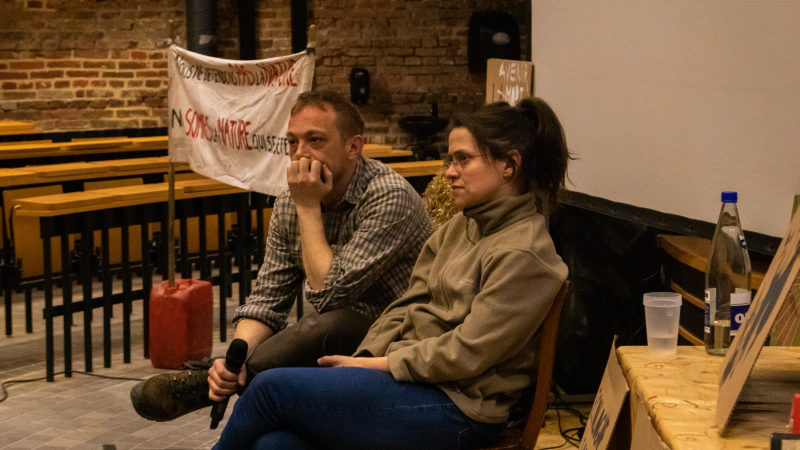
After the play Nourrir l’humanité-Acte II, the actors talked with the students about the difficulties facing the farming community in Belgium.
The programme of the two days was similar, with different workshops or educational modules and a central activity for all the students: the theatre play Nourrir l’humanité-Acte II. By means of a series of authentic testimonials from farmers, the actors in the Adoc theatre company confronted the students with the difficult living and working conditions in the farming community in Belgium.
During the Jagros day, students were also able to choose between different workshops offered by a dozen external partners from the farming world (arable and animal farmers, farming organisations, etc.) and the non-profit sector (Rencontre des continents, Terre-en-Vue, Li Mestere, Greenpeace, Quinoa, etc.). It was an opportunity for them to talk to the guests about their jobs, the problems they encountered and the challenges facing today’s agricultural system, to link these ideas to food sovereignty and to find out about examples of alternatives and inspiring solutions.
Pastoralism in the spotlight
For Vétérinaires Sans Frontières Belgium, these awareness-raising days are also an excellent opportunity to talk about pastoralism, a way of life that is often unfamiliar to students in Belgium. This extensive livestock-keeping model, based on transhumance, is nonetheless very widespread in Africa, Latin America and Asia. In the arid and semi-arid areas where we work, such as Uganda, it is in fact the only livelihood for a large part of the population. Unfortunately, transhumant livestock keepers are encountering increasing problems: armed conflicts, competition between agricultural farmers and livestock keepers for access to land, drought, flooding and so on.
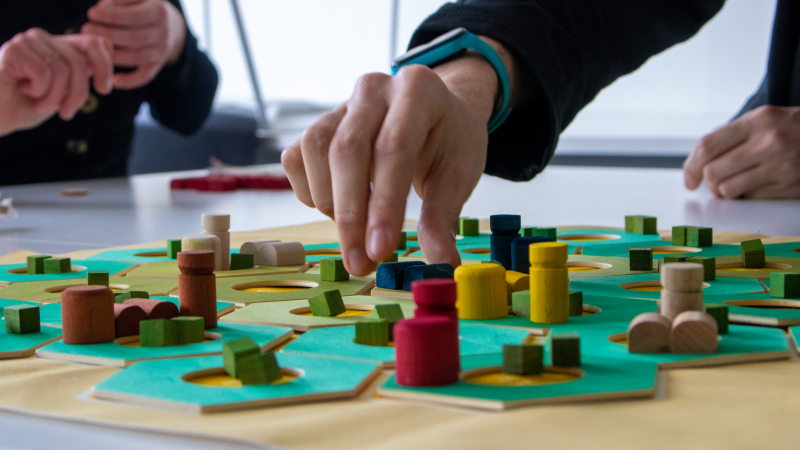
Vétérinaires Sans Frontières Belgium uses the board game Nomadsed to help students find out about the challenges of pastoralism.
For several years, we have used ‘Nomadsed’ to help students find out about pastoralism and the difficulties it entails. This is a board game in which students take on the role of pastoral livestock keepers and try to survive in the face of daily hazards. They soon discover that cooperation is the only way to achieve this. It is an interactive way to explore the reality of life as a livestock keeper and the solutions they try to find to perpetuate their way of life.
Advice for lecturers
Do you teach in higher education, and would you like to take part in the upcoming Jagros or Djesa days? Or would you simply like to tackle the topics of food sovereignty or pastoralism with your students? Contact Marie Lefèvre: m.lefevre@vsf-belgium.org.
Our awareness-raising activities in Belgium are made possible thanks to financing from the Belgian Development Cooperation and Wallonia-Brussels International.

